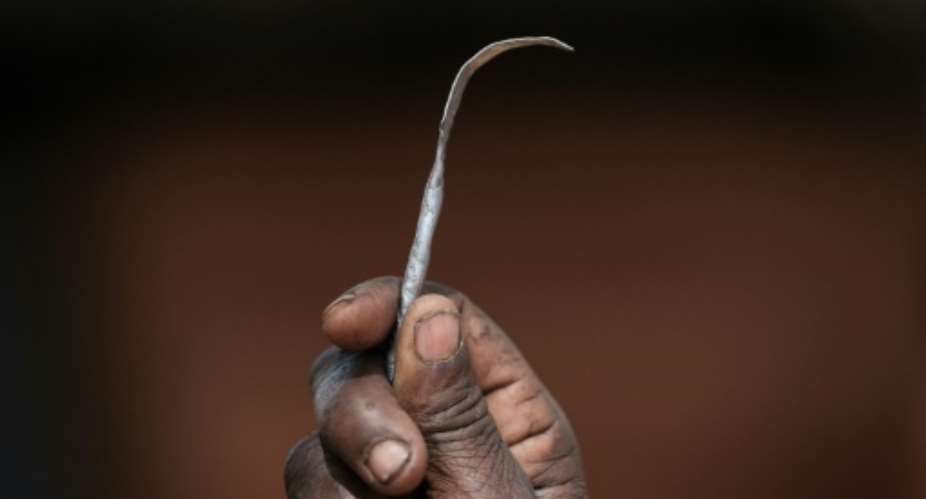Gambian lawmakers voted on Monday to advance to the next parliamentary stage a highly controversial bill that seeks to lift a ban on female genital mutilation (FGM), which has been in place since 2015.
The issue has divided the tiny West African nation for months, with hundreds gathering to protest outside parliament.
Pro-FGM campaigners outnumbered those calling for the ban to remain in place, according to AFP journalists.
"The bill seeks to uphold religious loyalty and safeguard cultural norms and values," Almameh Gibba, the lawmaker who introduced the bill, said during the debate.
"The use of a ban on female circumcision is direct violation of the citizens' rights to practise their culture and religion," he added.
But activists and rights organisations say the suggested legislation reverses years of progress and risks damaging the country's human rights record.
"There's the inherent risk that this is just the first step and it could lead to the rollback of other rights such as the law on child marriage... and not just in The Gambia but in the region as a whole," Divya Srinivasan, from women's rights NGO Equality Now, told AFP.
Lawmakers voted 42 in favour and four against to send the bill to a parliamentary committee for at least three months for further scrutiny before it returns for a third reading.
"To hear mainly men speak on behalf of women and speak about what should happen to the bodies of women is just the most disheartening thing," said anti-FGM activist Jaha Dukureh, who herself underwent the practice and watched her sister bleed to death following the procedure.
"As a woman who has lived with this practice, that was just one of the most heart-wrenching things to watch," she told AFP after the debate.
'Irreversible harm'
Seventy-six percent of Gambian women aged between 15 and 49 have undergone FGM, according to a 2021 report by the UN children's agency UNICEF.
UNICEF defines the practice as "the partial or total removal of the female external genitalia or other injury to the female genital organs for non-medical reasons".
It can lead to serious health problems, including infections, bleeding, infertility and complications in childbirth, and impairs sexual pleasure.
"Girls' bodies are their own. FGM robs them of autonomy over their bodies and causes irreversible harm," the UN's Gambia office posted on X, formerly Twitter, ahead of the debate.
The UN rights office had called for the bill to be withdrawn, while Amnesty International said it would set a "dangerous precedent" for women's rights.
Former Gambian dictator Yahya Jammeh banned FGM in the Muslim majority country in 2015, branding it outdated and not a requirement of Islam.
Parliament later adopted the first Gambian law specifically banning the practice, which is now punishable by up to three years in prison.
But since 2015, only two cases have been prosecuted, with the first conviction made in August 2023, according to Amnesty International.
The issue flared up last year, when three women received fines or prison sentences for performing FGM.
The Islamic Council, the country's main Muslim organisation, said the practice was "not just a merely inherited custom" but "one of the virtues of Islam".
It called on the government to reconsider the ban.





 We saved $57.9million from procurement of new verification devices, registration...
We saved $57.9million from procurement of new verification devices, registration...
 Ejisu by-election: Aduomi is a betrayer – Ahiagbah
Ejisu by-election: Aduomi is a betrayer – Ahiagbah
 Dumsor: I’ll be in police custody if I speak, I vex — DKB
Dumsor: I’ll be in police custody if I speak, I vex — DKB
 We'll give daily evidence of Akufo-Addo's supervised thievery from our next gene...
We'll give daily evidence of Akufo-Addo's supervised thievery from our next gene...
 Asiedu Nketia crying because they've shared the positions and left him and his p...
Asiedu Nketia crying because they've shared the positions and left him and his p...
 Mahama's agenda in his next 4-year term will be 'loot and share' — Koku Anyidoho
Mahama's agenda in his next 4-year term will be 'loot and share' — Koku Anyidoho
 If you're president and you can't take care of your wife then you're not worth y...
If you're president and you can't take care of your wife then you're not worth y...
 Foreign Ministry caution Ghanaians against traveling to Northern Mali
Foreign Ministry caution Ghanaians against traveling to Northern Mali
 GHS warns public against misuse of naphthalene balls, it causes newborn jaundice
GHS warns public against misuse of naphthalene balls, it causes newborn jaundice
 Our education style contributes to unemployment - High Skies College President
Our education style contributes to unemployment - High Skies College President
